The flight south from Moscow to Ingushetia takes only two-and-a-half hours, but on the ground it is sometimes hard to remember you are still in Russia.
Here is one of the three "Green Republics" of the Caucasus, the green flags of Islam flap against snowy mountains, women wear silk headscarves in public, and the sale of alcohol is now forbidden. In a demographic decolonization, the ethnic-Russian population has dropped from one-third at the end of the Soviet Union to less than one percent.
Traditional culture has rebounded as can be seen by the popularity of legzina - a dance where women float like long-necked swans, and men strut like eagles, wearing swords and imitation cartridge belts.
Recently, some of those cartridge belts have not been imitations.
Last year, insurgent violence across the Caucasus claimed 754 lives and more than 1,000 wounded. In that context, the toll of 35 dead and 168 wounded in the Moscow airport attack amounted to the visible tip of a largely hidden war. This conflict plays out in a daily grind of assassinations and bombings across Russia’s southern fringe.
In the capital of Ingushetia, Magas, security precautions speak of the invisible violence. Key government buildings are boxed in by six-meter fences. Police convoys aggressively move down roads, pushing oncoming traffic onto the shoulders.
Slide show reflecting on the culture of Ingushetia Republic
Traffic police stand tensely at intersections, automatic weapons at the ready. In Ingushetia, a republic smaller than Rhode Island, the smallest American state, 400 policemen have been killed in the past five years.
Behind layers of fences, Ingush President Yunus-Bek Yevkurov explains the enemy is the Caucasus Emirate, a loose franchise of groups rooted in the five main regions of the Caucasus.
Mr. Yevkurov, a former military intelligence officer, said the units are largely independent, but they are capable of joining up for joint actions. The compact leader bears the aches and pains of one Emirate action, a suicide bomb attack on his car 18 months ago that killed two people and put him in the hospital for two months.
He says the Caucasus Emirate wants to create an Islamic state, ruled by Sharia law, stretching from the Black Sea to the Caspian Sea.
To take this banner away from the fundamentalists, local leaders have created a region of Russia where traditional Islamic precepts prevail over Russian law. In Chechnya, where two wars in 20 years sharply reduced the male population, the government now encourages polygamy.
Government economic development officer Akhmed Paragulgov gave up drinking when he moved home two years ago from Moscow. He says there is more to the anti-alcohol campaign than police closing night clubs and rebels burning vodka stores.
He says there has been a radical change in society. Twenty years ago, people who drank were cool. Now they are social parasites.
Unemployment and poverty also push many young men to go to the forest, as the insurgency is called here. Officially, unemployment in Ingushetia is 50 percent. Incomes are around 20 percent of Russia’s national average of $10,000.
In the clan-based societies of the Caucasus, a lot of work is off the books, but the region still has Russia’s lowest incomes and its highest birth rates.
In the Ingush town of Malgobek, Lydia struggles to support her family on the $15 a day her son sometimes brings home from working on road-paving projects.
As in much of the Muslim world -- from Tunisia to Egypt to Ingushetia -- population expansion puts thousands of young people every year on a job market with few prospects.
In the Caucasus, the solution is to migrate North, or some people here say, "to Russia."
Russia’s work force is aging and shrinking.
Last year, it shrank by almost 1 million workers. Increasingly, Caucasus villages are populated by women, children and retirees.
The men are working up north.
But cultural clashes and the region’s reputation for violence has led some Russian cities to reject migrant workers from the Caucasus. The city councils of Moscow and St. Petersburg are debating codes of conduct in which migrant workers would be asked to only speak Russian in public, and to not wear national dress or perform national dances, like the Lezginka, in public.
Economic development official Paragulgov says the government has to walk a line between cooperating with host cities and coping with critics who say that migrant worker programs encourage cultural destruction.
He says the brand of the Caucasus is not very positive right now.
This alienation of Russians from the Caucasus is becoming a political issue. Russian nationalists increasingly say the country should retreat into a mono-ethnic state of its own.
They say that Russia pays almost 90 percent of the budgets for the Green Republics, while very few Russians still live in them.
A leader of the Slavic Union nationalist group, Dmitry Dyomushin, said in an interview in Moscow that he wants to say goodbye to the Caucasus.
He says, "I want a total separation of the Causasus from Russia - the Chechen, Ingush andDagestan republics."
For geostrategic reasons, the Kremlin clings to the Caucasus.
Stretching for 1,000 kilometers, the Caucasus range has 10 peaks higher than the highest peaks of the Alps. For two centuries, these mountains have served as a natural barrier between Russia and its southern rivals, Turkey and Persia.
Russian loss of control of the northern slopes of this mountain barrier, this theory goes, would open the flat plains of Russia’s Slavic Christian heartland to a Muslim thrust north.
Russian poet Alexander Pushkin captured his nation’s wariness of the Caucasus when he wrote, "Cossack! Do not sleep! In the gloomy dark, the Chechen roams beyond the river."
While the line was written 200 years ago, the sentiment fits modern Moscow.




